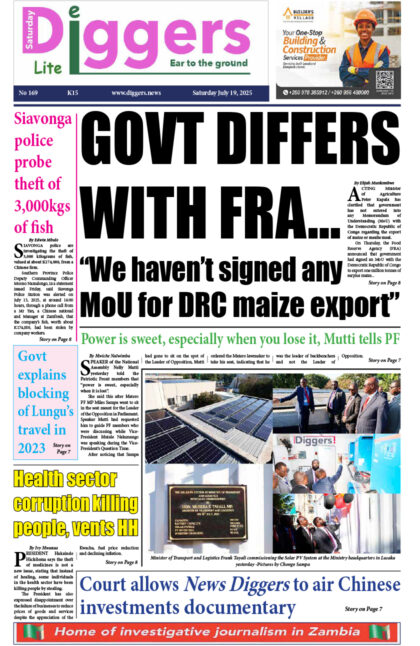The uninspiring and flat response from the UPND government, with a mere press release from the President’s Office among a few others, says a lot about their attitude towards suspected abuse of public funds and rampant corruption within the public sector. It cannot be business as usual in the face of such astonishingly high levels of embezzlement of public resources. It has been three frustrating years of high expectations by citizens to see the government take decisive steps to curb the worsening trends of corruption and theft of public resources.
It has become evident that the government starting with the presidency is paying lip service to the corruption fight. Actions or words this far are not enough, and the culprits are acutely aware that nothing will befall them. This has emboldened them to perfect their corrupt ways. Every year the #FICTrendsReport is produced with high-level recommendations to curtail corruption to no effect. Why is this the case? Why is there so much disinterest from all quarters of government in implementing robust preventive measures against the scourge of corruption?
Since 2022 there is little evidence of any meaningful, concrete measures and intervention by this government to prevent and stop the embezzlement of billions of public funds. The minimal results by the LEAs such as the ACC and DEC, among others, show that more action is required if this trend is to be nipped in the bud sooner rather than later. Equally, any legal or regulatory measures put in place to curb the scourge have not worked going by the exponential percentage increase of suspicious transactions. Parliament too is slackening on its oversight function of enacting robust laws and holding the Executive accountable in their anti-corruption drive.
For context, the over ZMW13.5 billion flagged by the Financial Intelligence Centre’s 2023 #FICTrendsReport is one-third of the proposed ZMW41.9 billion Supplementary Budget issued by Finance Minister Dr. Musokotwane three weeks ago. Are we financing the many Politically Exposed Persons and public officials that have been cited in the report or working to grow the economy and alleviate the raging hunger situation across the nation, #Zambia?
The FIC has continuously presented crucial recommendations to tackle financial crimes in Zambia decisively. These recommendations encompass enforcing stricter disclosure requirements, imposing stiffer penalties for corruption including life jail sentences, restricting cash transactions, introducing lower tax rates for electronic transactions, bolstering beneficial ownership disclosure, and raising awareness of financial crimes. These recommendations are aimed at significantly enhancing compliance, detection, and prevention of financial crimes in Zambia. What is missing, however, is matching government commitment and measures to implement these recommendations.
It is incredible that barely a couple of weeks after scoring high on the debt restructuring front, Billions of Dollars are reported missing or unaccounted for in suspicious transactions and the best response the entire government can muster is a muffled and disinterested one. Corruption is still attractive to many public officials at the centre of these high volumes of suspected financial transactions. Something must be done and must be done now. These prohibitive astronomical figures also demonstrate that public institutions have become conduits of corruption and that public officials are in collusion with criminals and participating as enablers and facilitators of grand theft and embezzlement of public financial resources.
Every year the FIC trends report goes out, and the same predictable rhetoric is sent out as if there is a template ready. The President must do more than merely ask the LEAs to act but shake up their teams to breathe life and purpose. Can we get people to be swiftly prosecuted and those found guilty jailed and lose property as immediate & short-term actions? The FIC report shows recoveries and asset forfeitures are too minimal, complex and expensive making the whole exercise a futility. The fact that culprits are emboldened to repeat these despicable actions every year shows that the system, laws and any deterrents already in place are weak or broken and need urgent recalibration to forestall the cancerous scourge from deepening.
The deterrent and preventive measures must be the first line of defence in the anti-corruption architecture against such financial crimes. While investigations, prosecution, and recoveries continue, they are expensive, ineffective and often never fully restore the embezzled public funds and resources as only a small percentage is usually successfully recovered.
The government must therefore make corruption, and plunder of public resources a scary offence by enacting laws that exact the most punitive sanctions including life sentences and banning convicted individuals from aspiring or holding public office for their entire lifetime among other sanctions. Further, the state must enact laws that publicly list convicted corrupt persons to make it hard for them to enjoy their loot while the masses suffer from the effects of corruption! These must be medium-to-long-term measures to stop corruption.
(The author is a Zambian citizen, Lecturer in Media Studies, Political Communication, and Journalism and an advocate for press freedom and freedom of expression. Send feedback to [email protected])



















